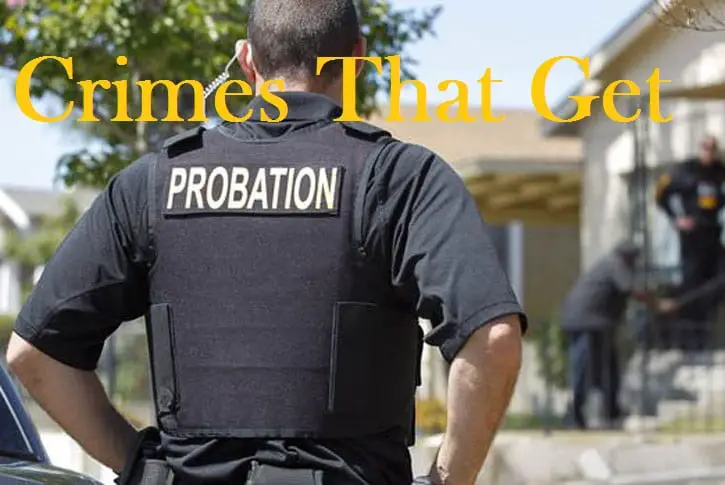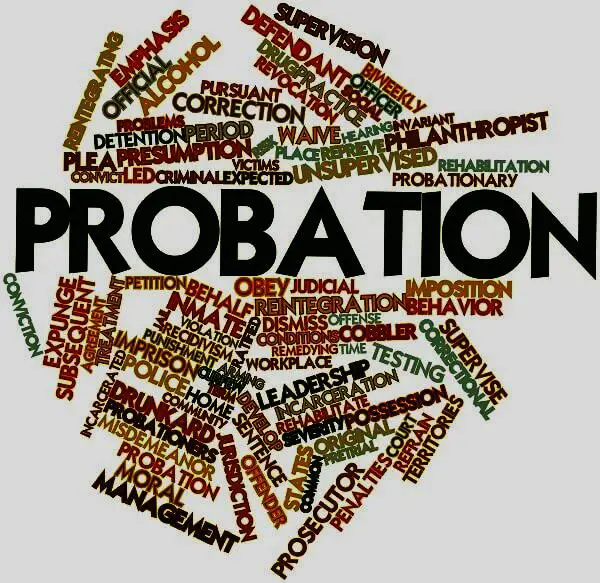Probation is a court order that keeps convicted offenders in the community, instead of serving jail time.
Although probationers – people granted probation – are required to abide by some set of laid down rules during their stay, it feels a lot better than being incarcerated in a cell packed with criminals. A probation order is your first step at amending your ways and turn over a new leaf after conviction.
Apparently, a probation order sounds a lot better than a jail-time sentence.
So, the big question is: why isn’t everyone getting probation?
Simple – not all convictions are eligible for probation.
Recommended: What is Probation and How does it Work?
Crimes That Get Probation

One of the frequently asked questions federal criminal defense attorneys receive is: Am I eligible for probation? Do you wonder the same?
Read on to find out…
While the judge is vested the authority to order probation for a conviction, the probation officers evaluate the defendant – according to the provisions contained at 18 U.S.C sect 3561.
The law says convicted offenders may be sentenced to probation, except on the following conditions:
- Individuals guilty of Class A– and/or Class B-grade felony
- An offense for which probation terms have been expressly precluded.
- Where the defendant is pronounced guilty of an imprisonment term, at the same time, for similar or different non-petty offenses.
That said, crimes related to firearms, violence, and immigration are less likely offered alternate sentences such as home confinement and probation. However, offenders convicted for money-related crimes like fraud, larceny, and other white-collar crimes may get the most chances of getting probation.
Some finance-related convicted offenders are most likely considered for probation – and other alternative sentences. They get probation since they can easily make restitution, in the form of reimbursement, to the victim of a crime.
Where a defendant is eligible for probation, the 18 U.S. Code § 3561(b) stipulates a 1- to 5-year probation term.
Satisfying Probation Conditions
While probation still comes with lots of dos and don’ts –referred to as probation conditions – it is a lot better than doing time in jail. So, you may be considered lucky.
That said, to avoid further legal issues, it is in your best interest to abide by the rules and regulations during your probation duration. Failure to obey the terms of probation is considered a Violation of Probation, which may attract more legal penalties.
Read also: What is Felony Arraignment?
You would receive a list stating the probation conditions. However, if the court does not provide the list, do well to talk to your attorney about it. Remember, you may lose your probation at any slip-up.
Ensure you report to your probation officer always. Thrive to satisfy all probation conditions without any nagging from the probation officers assigned to you. It is also vital to begin, early, to build a good rapport with your officer.
Remember, probation is more of a paused sentence, pending satisfaction g your probation conditions. Where any of the conditions are violated, the judge reserves the power to order a probation revocation and send you back to pay your jail time sentence.
Frequently Asked Questions About Probation

Can I get probation if found guilty of a federal crime?
The fact is, getting a probation order in a federal court can be difficult. In federal courts –unlike states’ – convicted offenders will most likely serve out their prison sentences, trailed by supervised release.
For state courts, convicts are usually first offered probation. A prison sentence is usually given in case of a probation violation.
The terms of sentencing – the severity of crimes and applicable punishments – are expressly stated on the federal sentencing guideline table – from minor offenses to most heinous crimes.
Criminal defense attorneys will, however, try to shift their clients from a severe offense to a minor ones. There are different ways to achieve this. Federal laws posit that offenders are not obligated to serve the sentences as outlined in the sentencing guidelines. This means you can push a little further for a customized sentence. This is where the professionalism of a seasoned attorney comes in.
Typically, your lawyer would plead your case, spotlighting all your excellent characteristics, revealing all the impressive things the judge never knew about you. If he is convincing enough, the judge may look down the table and give a lesser sentence. Apparently, the sentencing guideline would have been altered.
Recommended: Larceny vs Theft
Do most federal crimes get a trial or a plea?
A truckload of criminal cases are pleaded out. Why? Because a plea agreement will reduce the sentence. Defendants, therefore, may be pressurized to plead guilt to avert the severe penalty the federal criminal justice system is hungry to serve them.
Where, however, a case ends in a trial, it is imperative to hire a trial-experienced attorney. It sure will go a long way.
Will a federal conviction have me serve the whole sentence?
In federal cases, convicts usually serve most of the full sentence. However, states like Texas are a bit liberal with their parole rules. Convicted felons who are eligible for good time credits cancel eight days for every seven days spent. So, for longer sentences, these calculations will significantly reduce jail time.
Most cases, people serve most of the sentence pronounced by the trial judge. It is therefore advised that convicts run sentencing memorandum and push for a personalized sentence. This could help cut off your sentence, reasonably.
Get a lawyer specialized in federal criminal cases
Not all attorneys are licensed as federal court advocates. If your case would be prosecuted in a federal court, only a federal licensed defense lawyer can help out.
An unlicensed attorney will be required to file a motion for consideration as a federal court lawyer. Even worse, most state court attorneys struggle with federal court terminologies and general operations. If your hired attorney is not proficient in federal court procedures, you may end up with even a more severe sentence.
Recommended: Probation vs Parole
